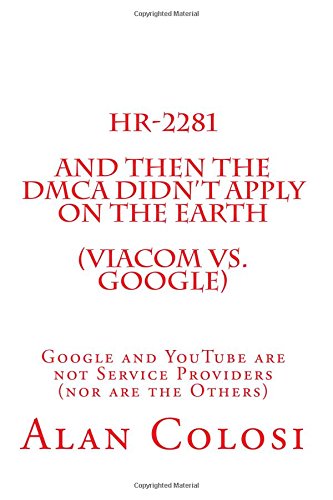Articoli correlati a HR-2281: And Then the DMCA Didn't Apply on the...
HR-2281: And Then the DMCA Didn't Apply on the Earth (Viacom vs. Google).: Google and YouTube are not Service Providers (nor are the Others) (Book 2 of 3) - Brossura

STEVE JOBS would wage *****Thermo-Nuclear War***** to his "last dying breath" against Google (see "Steve Jobs" by Walter Isaacson). On June 23, 2010, the case known as Viacom International, Inc./Paramount Pictures vs. Google, Inc. /YouTube, Inc. (07-cv-02103, U.S. District Court, Southern District of New York (Manhattan)) was decided by United States District Judge, Louis L. Stanton. This district level federal case which dragged for three (3) years concerned the infringement and exposition of Viacom’s copyrighted content on a public display by YouTube, owned and operated by Google. The public display was—and still is—an immediate worldwide distribution. Viacom asked for $1 billion USD in damages, but Judge Stanton ruled against Viacom and in favor of YouTube. YouTube claimed their business was defined as a “service provider” under the provision that classifies a service provider inside HR 2281, the law document also known as The Digital Millennium Copyright Act of 1998 (DMCA). According to Google/YouTube, their existence as a combined company was not responsible for any infringement that occurs on their business model which existed, and still does exist, on the Internet. Only if a content owner notified them properly, in accordance with a so-called phrase characterized as a “DMCA Takedown Notice”, could Google/YouTube then act and remove (or block) the infringed content. The court released over five hundred sixty-three documents of evidence that contained emails, text messages, depositions, white sheets, financial statements, etc. for public consumption. In addition, all arguments, case law, statutes, amici curiae, authorities, and judgments are public record. Viacom provides a majority of these documents on their litigation homepage with additional essays that attempt to explain the law in their favor. However, Viacom still lost the case. Therefore, in actuality these documents portray themselves as a plea for assistance—to find the truth; to find the facts.This book is the result of reading every document in that case, line-by-line, amid the study of the statutes, case-law, legislative material, non-redacted evidence, and additional facts with the knowledge of computer science, which apparently is lacking with lawyers, judges, and even the US Congress, but certainly not with Google, YouTube and many clones.Available here are all of the briefs submitted to Viacom's counsel that were created by discovery in the order presented, leading to an amicus curiae equivalent that argues 17 USC § 512(k)(1), the 1998 "service provider" definition inside HR 2281.QUESTION: Are Google and YouTube really service providers under 17 USC § 512(k)(1)(B)? They claim that they are; however, copyrights are a secured exclusive right, a monopolistic right with trademarks and patents demarcated by Congress under Article 1, Section 8, Clause 8 of the US Constitution. In fact, copyrights are not a third place, runner-up, sacrificial lamb for a new form of free speech that creates environments to "assert other people's speeches" without permission in "bad faith".The Bible of Digital Copyright Law will find that Google and YouTube are not service providers under 17 USC § 512(k)(1)(A) and/or 17 USC § 512(k)(1)(B). And if a Bible of Digital Copyright Law proves that is true, then how much has actually been stolen from copyright and trademark owners by pressing buttons?RESOLVED: An argument in digital copyright law.COPYRIGHT:Copyright © 2010-2011 ALAN COLOSI. ALL RIGHTS RESERVED
Le informazioni nella sezione "Riassunto" possono far riferimento a edizioni diverse di questo titolo.
L'autore:
ALAN COLOSI is a Cum Laude Bachelor of Arts degree graduate in Computer Science with Japanese as the foreign language from BOSTON UNIVERSITY, The College of Arts and Sciences (CAS '00). Having traveled to Japan 91 times from Boston, MA, USA with over 3 Million miles as an Emerald Member with The One World Alliance, Mr. Colosi maintains countless years of computer programming, radio, media, market research and journalism experience integrating both English and Japanese. Prior to BOSTON UNIVERSITY, Mr. Colosi worked at radio stations WXKS-FM, Boston, MA as a core programmer (1984 - 1988) and KISS-FM LONDON (as a reporter 1991-1993) and currently is the owner and operator of SHADO CONTROL management ... http://www.shado-x.com ... maintaining the site for over 15 years with business news and information, merchandise sales, and advertising in fields emphasizing science, the arts, and business analysis by constructing mathematical theory with successive growth. Mr. Colosi has studied intellectual property law.
Le informazioni nella sezione "Su questo libro" possono far riferimento a edizioni diverse di questo titolo.
- EditoreCreateSpace Independent Publishing Platform
- Data di pubblicazione2011
- ISBN 10 1467995576
- ISBN 13 9781467995573
- RilegaturaCopertina flessibile
- Numero di pagine326
(nessuna copia disponibile)
Cerca: Inserisci un desiderataSe non trovi il libro che cerchi su AbeBooks possiamo cercarlo per te automaticamente ad ogni aggiornamento del nostro sito. Se il libro è ancora reperibile da qualche parte, lo troveremo!
Inserisci un desiderata